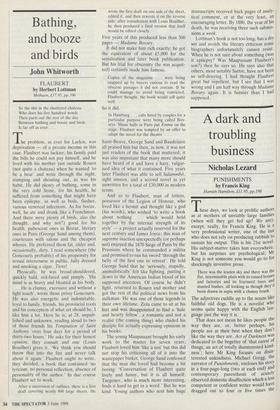Bathing, and booze and birds
John Whitworth
FLAUBERT by Herbert Lottman
Methuen, £17.95, pp.396
So the shit in the shuttered chateau Who does his five hundred words Then parts out the rest of the day Between bathing and booze and birds Is far off as ever . . .
The problem, as ever for Larkin, was deprivation — of a private income in this case. Flaubert was luckier; his family paid the bills he could not pay himself, and he lived with his mother just outside Rouen (not quite a chateau) when he wanted 'to be a bear' and write through the night, stamping and shouting out, as was his habit. He did plenty of bathing, some in the very cold Seine, for his health; he suffered from something that might have been epilepsy, as well as boils, flushes, various venereal infections. As for booze, well, he ate and drank like a Frenchman. And there were plenty of birds, also (he thought, and why not?) good for his health, pubescent ones in Beirut, literary ones in Paris (George Sand among them), courtesans with salons and the cheapest whores. He preferred them fat, older and, occasionally, dirty. I read somewhere (the Goncourts probably) of his propensity for sexual intercourse in public, fully dressed and smoking a cigar. Tiens!
Physically, he was broad-shouldered, quickly bald, red-faced and pimply. 'His mind is as heavy and bloated as his body. . . . He is clumsy, excessive and without a light touch', wrote those prissy Goncourts. He was also energetic and indomitable, loyal to family, friends, his provincial roots and his conception of what art should be; I like him a lot. Here he is, at 28, unpub- lished and unknown, reading aloud to two of those friends his Temptation of Saint Anthony 'over four days for a period of thirty-two hours.' He asks for their honest opinion; they consult and one (Louis Bouilhet) gives it. 'We think you should throw that into the fire and never talk about it again.' Flaubert ought to write, they decided, a book that contained `no lyricism, no personal reflection, absence of personality of the author.' In due course Flaubert set to work. In Hamburg . . . cabs hired by couples for a particular purpose were being called Bov- arys. Music halls in Paris put Emma on the stage. Flaubert was tempted by an offer to adapt the novel for the theatre . . .
Saint-Beuve, George Sand and Baudelaire all praised him but then, as now, it was not just readers of the book that mattered; it was also important that many more should have heard of it and have a hazy, vulgar- ised idea of what it contained. Five years later Flaubert was able to sell Salammbo, sight unseen, and a second novel as yet unwritten for a total of £30,000 in modern terms.
And so to Flaubert, man of letters, possessor of the Legion of Honour, who lived like a hermit and thought like a god (his words), who wished `to write a book about nothing . . . which would hold together by the internal strength of its style' — a project actually reserved for the next century and James Joyce; this man of supreme inaction unexpectedly (or perhaps not) enjoyed the 1870 Siege of Paris by the Prussians where he commanded a militia and promised to run his sword 'through the belly of the first one to retreat'. He told George Sand that he 'seriously, stupidly, animalistically' felt like fighting, putting it down to the American Indian blood of his supposed ancestors. Of course he didn't fight, returned to Rouen and mother and got the rest of the political news from his milkman. He was one of those legends in their own lifetime. Zola came to sit at his feet and was disappointed to find a 'hale and hearty fellow', a romantic and not a realist (the coming thing) who chided his disciple for actually expressing opinions in his books.
The young Maupassant brought his early work to the master for seven years; Flaubert loved him 'like a son' but this did not stop his criticising all of it into the wastepaper basket. George Sand confessed that the man she loved had become a bit boring. 'Conversation of Flaubert quite lively and funny, but it is all himself; Turgenev, who is much more interesting, finds it hard to get in a word.' But he was kind. Young authors who sent him huge
wrote the first draft on one side of the sheet, edited it, and then rewrote it on the reverse side; after consultation with Louis Bouilhet, he then produced a final version that itself would be edited closely.
Five years of this produced less than 300 pages — Madame Bovary.
It did not make him rich exactly; he got the equivalent of about £5,000 for the serialisation and later book publication.
ted) certainly made him famous.
Copies of the magazine . . . were being snapped up by buyers curious to read the obscene passages it did not contain. If he could manage to avoid being convicted, Flaubert thought, the book would sell quite well.
So it did.
manuscripts received back pages of analy- tical comment, or at the very least, an encouraging letter. By 1880, the year of his death, he was receiving three such submis- sions a week.
Lottman's book is not too long, has a dry wit and avoids the literary criticism some biographers unfortunately cannot resist. When he is not sure about something (was it epilepsy? Was Maupassant Flaubert's son?) then he says so. He says also that others, most notably Sartre, have not been so self-denying. I had thought Flaubert great but repellent, but I see that I was wrong and I am half way thtough Madame Bovary again. It is funnier than I had supposed.
•


















































 Previous page
Previous page